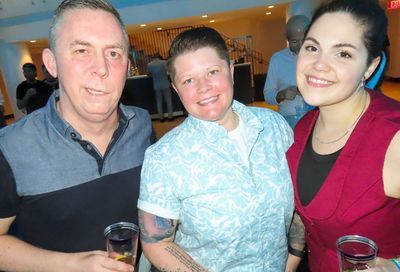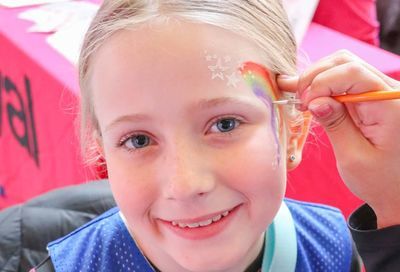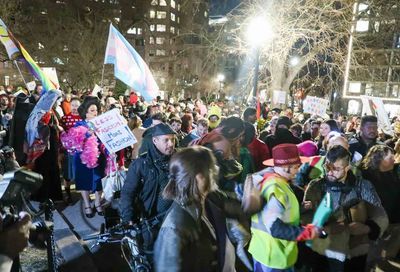Just another Sunday
American Easter from the outside
It only takes a few seconds and I’m there.
Thirteen years old again, at a Christian camp with a group of 10 other boys, in towels. We were getting ready for the evening shower. Among us was a heavier kid, and it was only a matter of time before three or four kids started to taunt him by making fun of his weight.
They were brutal. And there was a part of me that was relieved. They were making fun of someone else, and not me. I’m not sure where I was mentally at that point in terms of my gay evolution, but regardless of that, I’ve always had a sense of being different, and standing out, not necessarily in a good way. And that night, I did stand out.
For one, I was a Muslim. My father had sent me to the camp with a neighbor friend who was one year younger than me in an attempt to make me more masculine or boyish, I guess. Whatever his reasoning was, I know he had good intentions, and I had a blast, so I didn’t care.
But things changed that night. Our group counselor interrupted the taunts and told the boys to stop.
”Aren’t we all men?” he asked. ”Aren’t we all Christians?”
And that was the moment that I realized I did not belong. I had been at the camp for a couple of days, and for some reason I sort of forgot that everyone there had a different religion than I did. Even while singing songs about Jesus and ”the Lord” there was a message of unity and peace that transcended our differences. But all that was taken away with that one question. It made me realize that I was different and somehow less than everybody else there — I knew that I wasn’t included in that equation.
And so, from that night forward, I’ve immaturely equated anything related to Christianity with those feelings of isolation.
It doesn’t happen as often as you’d think it would. I mean, the last thing I think about when Christmas rolls around is Christianity. Instead my head is filled with the loud noises of shopping malls, traffic jams and the bitterly cold weather.
And Easter hasn’t been much different.
Up until this year, the first thing that came to my mind when I would think of Easter was decorative eggs. Not the Easter Bunny, not the resurrection of Christ, just colorful eggs. And that’s because I am from Iran, and Norouz, the Persian New Year, is celebrated on March 21.
Part of the celebration includes a ”Haft Sin,” which translates as the ”Seven S’s.” This is basically a table, decorated with seven items that start with the letter ”S” in Farsi, which correspond to seven creations and the holy immortals protecting them. Barley or other greens represent rebirth; dried fruit of the oleaster tree stands for love; garlic stands for medicine; apples are there for beauty and health; sumac berries stand for the sun; vinegar represents age and patience; and pudding symbolizes affluence.
There are other things at the table as well, that don’t necessarily start with the letter ”S,” including a bowl of decorative eggs, symbolizing fertility, with one egg for each member of the family. It might have been fun to color eggs as a child, and it might be fun again in adulthood, but somewhere in my adolescence I fell off the egg-decorating wagon and Easter became a holiday of convenience, in that it created an alternative in having to paint hard boiled eggs every year.
If you walk into a convenience store in late March you’re overwhelmed with pastel colored-candies and a gazillion different kinds of decorated chocolate eggs. And so, for a decade now, my parents have been using American Easter eggs to decorate their Norouz Haft Sin. To me, that’s Easter.
But all of that changed this year, because for the first time, I was included in actual Easter events. It’s the first year that my boyfriend and I have lived together, and his family has invited us over for Easter Sunday. A co-worker of his also invited us to an ”Easter Pageant,” whatever that is.
The point is, I was included, and it made me realize what that camp counselor meant when he asked us if we were all Christians. He wasn’t singling me out. He probably didn’t know that I wasn’t Christian. He was trying to point out that despite all of our differences, we all had something in common.
And it only took a couple of invites to make me realize that we did, regardless of what our religions might be.
Support Metro Weekly’s Journalism
These are challenging times for news organizations. And yet it’s crucial we stay active and provide vital resources and information to both our local readers and the world. So won’t you please take a moment and consider supporting Metro Weekly with a membership? For as little as $5 a month, you can help ensure Metro Weekly magazine and MetroWeekly.com remain free, viable resources as we provide the best, most diverse, culturally-resonant LGBTQ coverage in both the D.C. region and around the world. Memberships come with exclusive perks and discounts, your own personal digital delivery of each week’s magazine (and an archive), access to our Member's Lounge when it launches this fall, and exclusive members-only items like Metro Weekly Membership Mugs and Tote Bags! Check out all our membership levels here and please join us today!





















